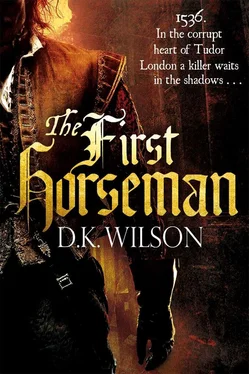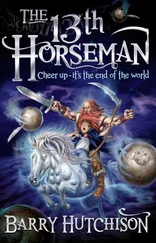D. Wilson - The First Horseman
Здесь есть возможность читать онлайн «D. Wilson - The First Horseman» весь текст электронной книги совершенно бесплатно (целиком полную версию без сокращений). В некоторых случаях можно слушать аудио, скачать через торрент в формате fb2 и присутствует краткое содержание. Год выпуска: 2013, ISBN: 2013, Издательство: Little, Brown Book Group, Жанр: Исторический детектив, на английском языке. Описание произведения, (предисловие) а так же отзывы посетителей доступны на портале библиотеки ЛибКат.
- Название:The First Horseman
- Автор:
- Издательство:Little, Brown Book Group
- Жанр:
- Год:2013
- ISBN:9781405518871
- Рейтинг книги:5 / 5. Голосов: 1
-
Избранное:Добавить в избранное
- Отзывы:
-
Ваша оценка:
- 100
- 1
- 2
- 3
- 4
- 5
The First Horseman: краткое содержание, описание и аннотация
Предлагаем к чтению аннотацию, описание, краткое содержание или предисловие (зависит от того, что написал сам автор книги «The First Horseman»). Если вы не нашли необходимую информацию о книге — напишите в комментариях, мы постараемся отыскать её.
The First Horseman — читать онлайн бесплатно полную книгу (весь текст) целиком
Ниже представлен текст книги, разбитый по страницам. Система сохранения места последней прочитанной страницы, позволяет с удобством читать онлайн бесплатно книгу «The First Horseman», без необходимости каждый раз заново искать на чём Вы остановились. Поставьте закладку, и сможете в любой момент перейти на страницу, на которой закончили чтение.
Интервал:
Закладка:
All this was putting flesh on the bones of what I had already heard about the northern rising and it seemed that Ned’s assessment of royal policy was close to the truth.
‘Tell Master Treviot about that Aske fellow,’ Ben prompted.
‘Aske? He’s a gentleman, a one-eyed lawyer from Selby; clever. But for all his birth and learning he was one of us — or so we thought. At the beginning he had captured Pontefract Castle, taken Lord Darcy and the Archbishop of York prisoners and rallied the host to march south. But then he started listening to the other captains, the well-bred fainthearts, and he changed his tune. So all that came out of the York council was agreement for the captains to meet with the Duke of Norfolk at Pontefract. Another council. More talking… talking… talking.’ Bart’s head began to droop.
Ben nudged him. ‘Tell Master Treviot about the ship at Hull.’
‘Ship… Hull… Yes.’ Bart shook his head and rubbed a hand over his eyes. ‘Pontefract was a dis… dis… traction. Many pilgrims rode to Pontefract but we got news that a king’s ship had arrived in Hull. It was loaded with ordnance for Norfolk and the army. Sir Robert Constable called for volunteers… Never volunteer… Never… Never.’ Bart slumped on to the table.
Ben hauled him upright and slapped his face but his friend only groaned and his head fell forward again, until it was resting on his arm on the table. Ben shrugged. ‘I’m sorry,’ he said. ‘Bart’s not fit for company. He’s been through a great ordeal.’
‘Let him be,’ I said. ‘What happened at Hull?’
‘Bart and his “pilgrims” boarded the ship. There was a fight. That was when he lost his arm. Luckily someone got him to a surgeon, who did a proper amputation. He’s still in pain but he refuses to give in to it. Meanwhile, the Duke of Norfolk had promised the rebels a complete pardon and agreed to all their terms. Aske disbanded the host and accepted an invitation to come south for personal talks with the king.’
‘So it really is all over,’ I suggested.
Ben frowned. ‘I wonder. Bart doesn’t think so. He’s convinced that the rebels were tricked into going home. Norfolk was simply driving a wedge between the commons and their betters. Aske isn’t the only one of the captains coming to London. They’re all flocking here, eager to demonstrate their loyalty. Bart reckons there will be no pardon. As soon as the pilgrims are dispersed, the army will be sent in to exact the king’s revenge.’
‘ Exitus acta probat ,’ I murmured, half to myself.
To my surprise, Ben responded. ‘Oh yes, there’s no morality in politics now. Perhaps there never has been.’
‘Why has Bart come back?’ I asked.
‘He seems to think he has some sort of mission. As soon as he was able, he got on a horse and rushed to London. He aims to seek out the turncoats and confront them. You can see why we have to keep an eye on him.’
‘Why us?’ Sarah demanded sharply.
‘Because he has no one else. He’s broken his indentures by rushing off. Neither his family nor his old master want anything to do with him. We’ve been over all this a dozen times, sweetheart.’
Sarah pouted. ‘I know you feel loyalty as his friend but he has only himself to blame and we have problems enough of our own.’ She turned to me. ‘Master Treviot, can’t you make my dear dolt of a husband see sense?’
‘I’m sure none of us wants to see Bart whipped through the City at a cart’s end for begging in the street,’ I said. ‘Perhaps, between us, we can find him a job.’
‘What jobs can a one-armed man do?’ Ben asked mournfully.
‘He has a mind,’ I said, ‘and it seems he knows how to use it.’
‘Oh yes,’ Ben agreed readily. ‘He went to a grammar school and has good Latin. He isn’t foolish. If anything, his problem is that he thinks too much.’
‘Then, perhaps we can persuade him to channel his thoughts into something more positive than rebellion. I’ll make some enquiries among my merchant friends. But you will have to sober him up — in more ways than one. No respectable businessman has room for a powder keg that’s liable to explode at any time.’
Smiles of relief appeared on the faces of the newlyweds.
‘As for you two,’ I said, ‘your first task is to make peace with Sarah’s father.’ I ignored Ben’s scowl and went on. ‘I don’t think you want to remain at enmity with your family for the rest of your lives and I suspect they don’t want that either. The longer the estrangement lasts, the deeper it will become. It will be worth a little humbleness on your part to put a stop to it now. May I suggest that Christmas would be an appropriate time for a reconciliation? If your olive branch is spurned, come and see me again but, please God, that won’t be necessary.’
‘You collect people with problems, don’t you?’ Lizzie said after the others had left. ‘I feel sorry for that one-armed scapegrace.’
‘Oh, Bart is his own worst enemy,’ I replied, ‘like someone else I know.’
Lizzie made a face at me as she left the room.
In the days leading up to the festival, London was, as usual, abuzz with excitement and anticipation. The food sellers were doing good business and staying open late. My shop was busy with customers buying jewellery to give as New Year gifts or negotiating loans to pay for their celebrations. Christmas is the season of generosity, when households relieve the gloom of midwinter with feasting on the last fresh meat of the year, from fowls and beasts kept and fattened for the occasion. But there were other reasons for the euphoria that pervaded the City in the Nativity season of 1536. News had spread that the northern rebellion was over. The fear that disaffection would spread and that southern counties faced a possible inundation by peasants brandishing billhooks and pitchforks in the name of Holy Church had evaporated. The feeling of relief was almost tangible and seemed to be shared even by many who were in sympathy with the ‘pilgrims’. Also it was noised abroad that the king was coming.
The splendour of the royal court was very rarely seen on our streets. When Henry and his richly adorned attendants travelled to and from the palaces near the capital they almost invariably went by the river. The royal barge and a flotilla of other craft conveyed our social elite to Whitehall or Hampton Court or Richmond. But this year the king decided to keep his Christmas at Greenwich and to go there by road. This meant that his cavalcade would pass from Westminster, right through the City and across the bridge.
The immediate reason for the change of routine was ice. The river had a solid coating for a hundred yards or more upstream of the bridge and beyond that there was floating pack ice. But the bitter weather did no more than provide the opportunity for a royal show. Henry loved spectacle. Tournaments, pageants, processions — he was never the one to miss an opportunity for public display. And at no time did he have a greater need to remind the people of his power and magnificence than in the Christmastide of that woebegone year, 1536. The event planned for 22 December was to be a triumphal procession. Henry would appear before the citizens as their saviour, the warrior king who had delivered them from bloody rebellion. It mattered not that his victory had been achieved by guile rather than military might, nor that throughout the crisis he had not taken the field in person, but had skulked behind Windsor’s ancient walls. He would claim credit for defeating the ‘pilgrims’ and appear before a grateful populace to receive their plaudits.
The day before this display I received Lord Cromwell’s command to wait upon him at Greenwich on St Stephen’s Day, 26 December. Before then there was much to do. All householders whose properties fronted the processional route were required to deck their houses with tapestry and rich cloth and to ensure that the street was covered in gravel of a regulation depth so that the finely caparisoned horses did not become besmirched with mud. The hard frost made this task easier. The attitude of the overseers sent from Westminster did not. They expected citizens to spread gravel twice — once for the royal baggage wagons that would come through on the twenty-first and once for the court personnel. Several of us went to the Lord Mayor to protest strongly the impossibility of complying. He, in turn, rode to the palace to discuss the problem with the Master of the Horse. After much arguing, it was agreed that some at least of the court’s furniture and chests of plate would be transferred across the river from Whitehall and proceed from there along the south bank. The Lord Mayor agreed to allow the paraphernalia that could not be thus transported to be brought through the City and to keep back a supply of gravel to effect any repairs that might be necessary before the royal party entered via Ludgate and Paul’s Yard. As well as decorating my own house front, I had to help with the impressive furbishment of the stretch of road allocated to the Goldsmiths’ Company.
Читать дальшеИнтервал:
Закладка:
Похожие книги на «The First Horseman»
Представляем Вашему вниманию похожие книги на «The First Horseman» списком для выбора. Мы отобрали схожую по названию и смыслу литературу в надежде предоставить читателям больше вариантов отыскать новые, интересные, ещё непрочитанные произведения.
Обсуждение, отзывы о книге «The First Horseman» и просто собственные мнения читателей. Оставьте ваши комментарии, напишите, что Вы думаете о произведении, его смысле или главных героях. Укажите что конкретно понравилось, а что нет, и почему Вы так считаете.












